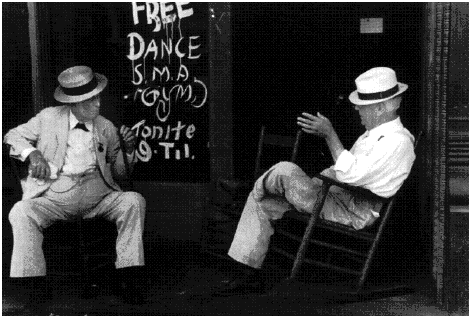Lard Sandwiches

He will be a Democrat all his life and will vote the straight ticket in thirteen presidential elections, walking miles overland to the polling place when the roads are impassable. He is tolerant of Republicans until they get evangelistic.
Salesmen frequently call on my grandfather, trying to sell him merchandise for his service station, and one summer day a carburetor cleaner salesman stops by. Though he does not intend to buy any carburetor cleaner, my grandfather has the courtesy to invite the man to stay for dinner. The salesman is a dignified old gentleman in suit pants and a white dress shirt stained yellow at the armpits. He dabs at his sweaty face with a handkerchief as they talk on the screened porch, waiting for my grandmother to put the meal on the table. I am sitting nearby, listening. When the carburetor cleaner salesman chances to say that Hoover hadn't been such a bad president after all, my grandfather stands, takes the man by the elbow, steers him to his car, and tells him never to set foot on his place again.
My grandfather will have suffered enough death in his long life that by the end of his days he will be completely at ease with it and ready to let it gather him into its arms. He will outlive his parents, all of his brothers and sisters, his infant son, his wife, one of his daughters, and one son-in-law. When he is in his mid-nineties, my mother and I will take him with us to the cemetery one Memorial Day. His wife and daughter are buried there, and my mother plans to plant some geraniums beside the family headstone. My grandfather is too stiff to get out of the car, and he sits in the backseat watching us attend to the graves. When we return to the car and are ready to drive away, an old man, one of the sextons at the cemetery, comes up and peers into the side window. "That you, John Moser?" he asks in a cracked voice.
"That's me, all right, Clarence," answers my grandfather.
"Well, how are you, John?"
"Well, Clarence, I'm ninety-four years old. I can't see too good, I can't hear too good, and I can't walk too good. You keep your shovel sharp!"
I once asked my mother if she had any idea how her father could have lived so long, considering he was a lifelong pipe and cigar smoker and had a fondness for lard sandwiches on white bread. Without hesitation, she said, "Pickles. He loved pickles, and he ate them almost every day."
So it is pickles, a strong stomach for relentless change, and a remarkable constitution. He is to pay premiums on a health insurance policy for almost fifty years and never submit a claim. Late in his life, a doctor in Dubuque, studying an x-ray of his abdomen for what turns out to be a minor complaint, will inform my mother that her father has no appendix. It had probably burst when he was young, the doctor speculates, and somehow he lived through it.
Ted Kooser
©2005 Bison Books